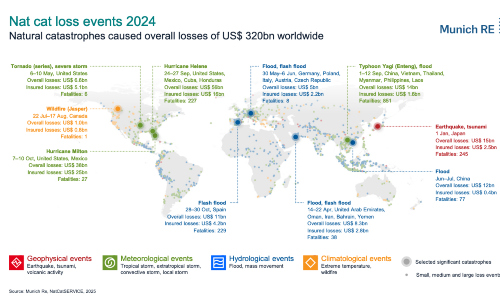Natural Disasters: The Billion Dollar Bill for Munich Re
The impacts of climate change and the associated rising risks and damages from natural disasters were already one of the major topics at the insurance industry meeting in Monaco in early September. Now, the world's largest reinsurer, Munich Re, has presented its estimates for the past year.
Currently, the media is dominated by images of the devastating fires in and around Los Angeles. Persistent drought and strong winds have fueled the fires, which have already claimed several lives.
That climate change is exacerbating natural disasters such as hurricanes, floods, or large-scale fires is no longer in doubt. This is also evidenced by the estimates now presented by reinsurer Munich Re regarding the damages from such events in 2024.
According to these estimates, the total economic losses from natural disasters worldwide in the past year amounted to $320 billion. Of these, $140 billion were insured, according to a study published by the Swiss insurer.
Third-Costliest Year Since 1980
This makes the past year the fifth-costliest year in terms of total damages since 1980 and the third-costliest in terms of insured losses. These values are also well above the inflation-adjusted average values of recent decades. The 30-year average for total damages stands at $181 billion, while the 10-year average is $236 billion.
«One heat record after another—the consequences are devastating,» said board member Thomas Blunck. «The destructive forces brought by climate change are becoming increasingly apparent, and this fact is backed by science. Societies must prepare for stronger weather-related disasters.»
Weather-related catastrophes accounted for 93 percent of total losses and 97 percent of insured losses for the year. Approximately 11,000 people lost their lives in 2024 due to natural disasters—significantly fewer than the average in previous years.
Largest Damages Caused by Hurricane Helene
The largest economic damage was caused by Hurricane Helene, amounting to $56 billion, of which around $16 billion was covered by insurers. Hurricane Milton caused total damages of $38 billion, with $25 billion insured.
The third-costliest natural event was the earthquake in Japan on New Year's Day 2024, which caused total damages of approximately $15 billion and insured losses of around $2,5 billion.
(Image: Munich Re)
Influence of Climate Change Widely Documented
The influence of climate change on weather-related disasters is widely documented by research, the insurer further notes. In many regions, severe thunderstorms and heavy rainfall events are becoming more frequent and intense. While the overall number of tropical cyclones is not necessarily increasing, the proportion of extreme cyclones is growing. These storms, in turn, tend to intensify rapidly during their development and bring with them extreme rainfall.
Flooding in Brazil, Valencia, and Dubai are also cited as examples.
«The cost of more severe weather extremes is borne by everyone, but especially by people in underinsured countries with less public financial capacity for rapid recovery,» commented chief climatologist Tobias Grimm. «The global community must finally act and find ways to strengthen the resilience of the most vulnerable countries.»


























